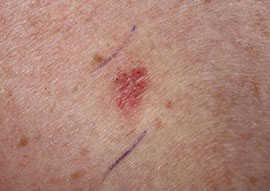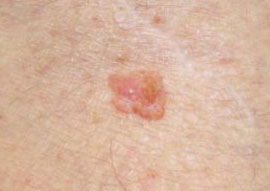Skin Cancer
Skin Cancer – Treatments And Steps You Can Take To Prevent It

Skin cancer is the most common form of cancer in the United States affecting one in five people by the age of 70. It occurs when there is a change in the DNA of cells causing an abnormal growth. These changes allow the cells to continue to replicate, without the usual mechanisms that prevent growth, causing mutation to occur in the cells.
Types Of Skin Cancer
Depending on the type of skin cell that has the mutation, one of these three types of skin cancer can occur:

Basal Cell Carcinoma
Basal cells are the deepest cells in the epidermis. Basal cell carcinomas are usually raised and often have a central portion, which is ulcerated. This type of cancer is the most common and almost never spreads to any other part of the body.
- Treatment
The lesions are typically removed with surgery, often under local anesthesia.

Squamous Cell Carcinoma
Squamous cells are the cells on the surface of the skin. These cancers often appear as scaly red patches that sometimes have ulcers in the middle and can look like warts.
- Treatment
These lesions will be treated with surgical removal or other methods that completely destroy the lesion.



Melanoma
Melanoma is the most dangerous form of skin cancer and results from mutations in melanocytes, which are part of the deepest layer of the skin. Melanocytes are the cells that give our skin color and are more numerous in people with darker skin. This cancer usually occurs in the skin, however it can appear in the eyes or at the anus.
Melanoma skin cancer is classified into different stages depending on the depth that it has grown to, along with lymph node status and whether it has spread to other parts of the body.
- Treatment
The most common treatment for melanoma is with excision that includes a border of normal tissue to ensure that the all of the cancer has been removed. Depending on how deep the cancer is your surgeon will frequently recommend taking lymph nodes during the procedure to ensure that the cancer hasn’t spread to them.
Can I Get Skin Cancer?
According to the Centers for Disease Control these factors make patients a higher risk for skin cancer:
- light colored skin
- family history of skin cancer
- prior history of skin cancer
- sun exposure
- sun burns (especially as a child)
- tanning (like in a booth)
- blue or green eyes
- blond or red hair
- certain moles
How Do I Know If I Have Skin Cancer?


It is important to check your body regularly for lesions that could represent skin cancer. Concerning spots on the skin can be remembered by the ABCDs.
- Asymmetric (the mole isn’t the same on both sides)
- Borders (the edge is uneven)
- Color (multiple colors in the lesion is concerning)
- Diameter (lesions greater than 6 mm or the size of an eraser head)
- Evolving size, shape, or diameter
If there is an area of concern, it may require biopsy or removal. The most common form of biopsy is a punch biopsy. In this procedure, the skin is cleaned and anesthetic is injected. A small circle of skin is taken and the hole is closed. There is typically minimal pain and scar associated with it.
The other kind of biopsy is an excisional biopsy. In this form, the entire lesion is removed completely after cleaning the area and using medication to numb it. The defect is then closed. If the biopsy demonstrates cancer, further treatment may be required.
Sometimes the biopsy itself removes enough tissue, otherwise a further excision may be necessary. In certain instances, lymph nodes may have to be removed at the same time. Once lesions are removed, they are sent to a pathologist to confirm what they are.
Can Skin Cancer Be Prevented?
The best way of preventing skin cancer is to wear protective clothing that blocks out those harmful UV rays and use at least SPF 30 year round (which blocks 97 percent of the sun’s UV B rays). People who are fair skinned or have freckles are at the highest risk from sun exposure. Tanning booths also significantly increase the risk of skin cancer.
It is recommended to have your skin checked annually. If you have lesions that are meeting the criteria listed above, have a new skin growth, or that you would like to have removed, please call our office today at 360.613.1335 to schedule your appointment.
